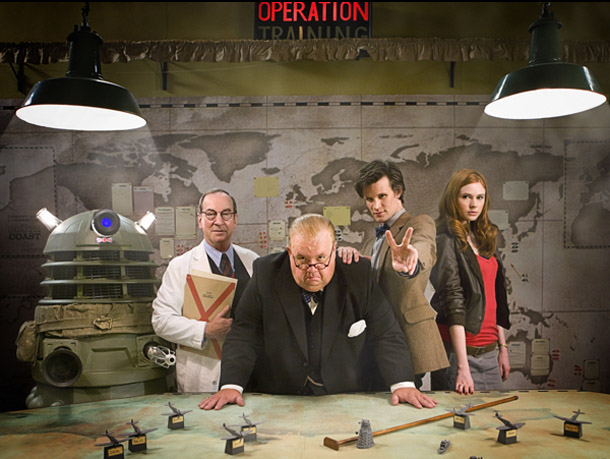Gatiss On Daleks
None
The full interview with “Victory Of The Daleks” writer Mark Gatiss, as promised…

SFX : The Daleks and World War II is a pretty splendid combination. Was that actually your pitch or was it something that Steven requested?
Mark Gatiss: “Steven simply said ‘Churchill vs the Daleks!’ And that’s one of those pitches that you want to be given. It’s not like ‘Picnic with a man’! It’s very exciting. And it came directly out of Steven taking his kids to the Cabinet War Rooms – they were absolutely spellbound by it. So that’s the setting. I was initially intimidated by the thought of doing the Daleks after all these years but then I suppose I’ve always had an idea of what I’d like to do with them. They are, weirdly, an inherently World War II feeling creature. The Nazi connection is there, and also the world of the early ’60s is very heavily post-War – they feel like they belong to it. There’s a nice match to it.”
SFX : It’s surprising that Doctor Who so rarely ventured into World War II, but then those early Dalek stories are such a metaphor for that period anyway. And historically the war was still quite a recent event when they were made.
“Yes, exactly. ‘The Empty Child’ was the first proper wartime one, along with ‘The Curse Of Fenric’. I’ve certainly tried to be careful in terms of taste. It’s not like Agincourt – it’s in living memory and it’s a very strong and vivid memory. So I wanted to have all the fun of a bank holiday war movie without taking the piss. And I have to say, in my research for it my respect for the people who went through the war only increased even further. It’s very hard to get any of that research into the episode because you don’t want to look didactic, but I was very careful to try and make it feel that the real war was still going on, and that it didn’t just stop for a fortnight to have a bit of fun in space!
SFX : What sort of research did you do?
“I read a couple of Churchill biographies but I also read a lot of wartime diaries from the Imperial War Museum. They’re amazing – I could not stop reading. The fact that it was such a fine line between victory and defeat for us. If the Luftwaffe had continued bombing British airfields for two more days that would have been it. It was only a complete fluke that they changed their minds. It makes you sweat reading it. And then people talking about the Blitz… There’s one amazing story about this nurse, who was talking about how people got incredibly used to the Blitz, almost bored of it. Some people just couldn’t take it. She was running towards a shelter with a friend and there was this man just standing in the road. They tried to get him to come down and he just said ‘Fuck off, I’ve had enough!’ He wouldn’t go down. They went to the shelter for half an hour, the all clear sounded and then it just says, in very plain script, ‘We came back up to the surface and the man was still in the road. But his head was six feet down the road.’ And then they went to work. And there were RAF pilots who had breakfast with their best friends in the morning, and by the evening they were all gone. It’s an incredible time. Literally awful – it’s appalling and yet filled with the most amazing life experiences. And Daleks!”
Get sneak previews, exclusive competitions and details of special events each month!
SFX : It’s very much a time period that our generation was familiar with through all the war comics and Sunday afternoon movies. But do you think that’s still true of today’s children?
“I’m sure it’s not. I always used to say to my dad that I had his childhood by proxy, with Arthur Askey films and Flash Gordon ! He’d talk about things and I’d know what he was talking about, because they were on telly. War comics are a vanished form, but my God we played ‘Japs and commandoes’ – I don’t imagine they’d do that now! It’s absolutely in my blood. I’m an odd homosexual, because I love war movies, I love James Bond and that kind of bank holiday ethic, the Where Eagles Dare thing, is just so steeped into me. I can’t imagine many more wonderful things than watching The Great Escape on a bank holiday Monday!”
SFX : Was Matt Smith cast when you wrote the script or did you find yourself writing a generic Doctor?
“No, he wasn’t. My first draft was just a generic Doctor. Steven has a theory that you write your default Doctor. He said, ‘The Doctor’s very Pertwee, isn’t he?’ And there I was thinking I was doing this bold new Doctor! And then I read it again and thought yes, completely Jon Pertwee! It’s a funny thing. You just can’t shift it. But then as soon as Matt was cast I watched Party Animals , the thing he did about politics, which is great, and in which he is very Doctory, I have to say. I watched him in anything I could and then got to know him a bit, and tried to download the speech patterns. Similar principle to doing Churchill, really, except Matt’s more accessible than Churchill! But I just looked at how he phrases things, and how his energy is, and tried to build it up from there.”
SFX : So what’s your take on Matt’s Doctor?
“I think he’s absolutely wonderful, hand on my heart. It’s obviously big shoes to fill, but as David himself said, the most exciting thing for a fan was the notion of change. And this is actually the most complete change there has ever been apart from the show coming back in 2005. There’s no companion bridging it. Matt’s a real eccentric in real life, but not in a forced way. He’s only 27 but he’s like Professor Yaffle! He’s charmingly old fashioned – he’s got fantastic manners. And because he wears glasses in real life he actually looks over his glasses when he’s wearing them! He looks at you like a schoolteacher. It’s just the most gorgeous attribute. He’s full of life and ideas and very funny. I think it’s in very safe hands indeed.”
SFX : What defines his Doctor for you?
“He’s the most boffiny Doctor ever. There’s a Troughtony quality to him, and Matt’s very keen on Patrick Troughton, but there is something about the elbow patches, something quite academic about him… you can imagine him having a blackboard duster in his pocket, and tinkering away in a back room on the atomic bomb or something! I’m already repeating cliches here but he’s very much the old man trapped in the young man’s body. It’s true! And he also has a sort of clumsiness. It’s like watching a newborn foal stumbling around a stable. He’s always knocking things over, and you start to write that in because it happens so often! He’s just got huge hands, huge hair and huge feet, and there’s something endearing about that, like a big child.”
SFX : He brings a lot of physical comedy to it as well, doesn’t he?
“Yes, he’s brilliant at it. And he cannot keep away from props. He’s always picking them up and throwing them around.”
SFX : People always say the Daleks are difficult to write for. Was that your experience?
“Yes and no. My direct inspiration will become clear – it’s ‘Power Of The Daleks’. It’s an episode I’ve never seen, but I love the idea of them being sly. It’s one of the most underused things in Doctor Who – the idea of them being silent and clever is very scary, much more so than when they’re just barking orders. So there’s the idea of them having to pretend to be something they’re not… Even if ‘Power Of The Daleks’ wasn’t lost you’d think it’s worth doing that idea again because it’s so strong. In a way it’s difficult because there are certain things you can’t imagine Daleks saying, but at the same time by making them sly and pretending to be what they’re not you can actually get away with it – as I hope I do with them saying, ‘Would you care for some tea?’ And that’s an amazing thing to hear in a Dalek voice! I hope it doesn’t sound like a sketch, but that’s the role they are playing in this episode.”
SFX : How far can you take that before it verges on send-up?
“Probably not that far! But I think it’s entirely down to how you’re treating the rest of the episode. In this episode the Doctor is the only one who knows what they are, and no one believes him. So hopefully you’re able to contrast the absurdity of a Dalek saying something like that with this furious Time Lord in the corner, trying to convince people that he’s telling the truth.”
SFX : What are the touchstone Dalek stories for you?
“I’m very fond of ‘Planet Of The Daleks’. I still love that. For all its flaws it’s kind of perfect. And I was watching Brian Cox’s Wonders Of The Solar System last week, and there are kind of icecanoes in the solar system! I thought well done, Terry Nation! People never believed you! ‘Power’ definitely, and I think ‘Death To The Daleks’ is massively underrated. A very interesting story. It’s Terry Nation thinking, ‘What haven’t I done?’ and taking away their power to kill… it’s fascinating stuff. I also like ‘Genesis’, obviously, and I’m very fond of ‘Revelation Of The Daleks’. And ‘Remembrance’ – brilliant story, that. Most of them, to be honest! I was watching ‘The Chase’ on the way down to Cardiff today, which I’ve only seen once, a long time ago, and it’s very odd that only the third Dalek story is the broadest in terms of comedy they ever did, and never really did again.”
SFX : Is it true you get to play a Spitfire pilot in this?
“When we were filming last summer someone came up to me and said, ‘Is it true you’re going to play the voice of the Spitfire pilot?’ And I said, ‘No…’ The next day two people approached me and said, ‘Oh, that’s clever – are you doing a cameo as the Spitfire pilot?’ And I said, ‘No…’ And then a few weeks ago Andy Pryor, the casting director, emailed me and said, ‘I understand you want to play the Spitfire pilot…’ I emailed him back and said, ‘No! But I will if you want me to!’ Thus do I become – Wikipedia take note – the first and only person so far to write for the series and be in it twice! Now that’s going on my tombstone.”
SFX : So did you get to do the whole Dambusters voice?
“I assumed it was all going to be done with effects, but I actually did a version clean and a version with my hand over my nose! It’s true… And because it’s from Where Eagles Dare I get to say ‘Broadsword to Danny Boy…’”
“Victory Of The Daleks” is on BBC1 this Saturday at 6.30pm and on BBC HD at 8.25pm.

Nick Setchfield is the Editor-at-Large for SFX Magazine, writing features, reviews, interviews, and more for the monthly issues. However, he is also a freelance journalist and author with Titan Books. His original novels are called The War in the Dark, and The Spider Dance. He's also written a book on James Bond called Mission Statements.


